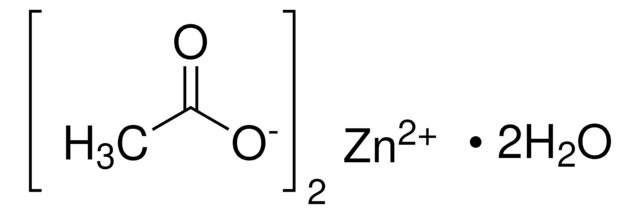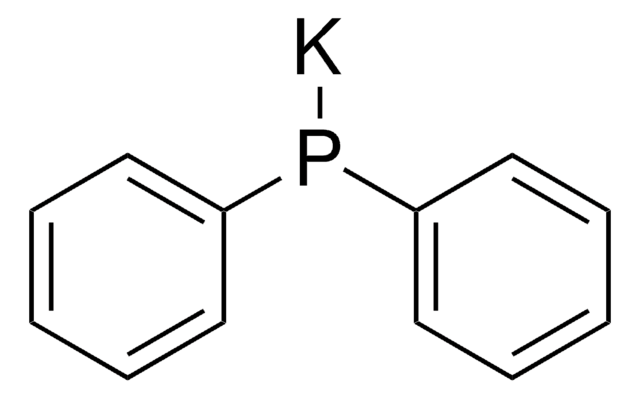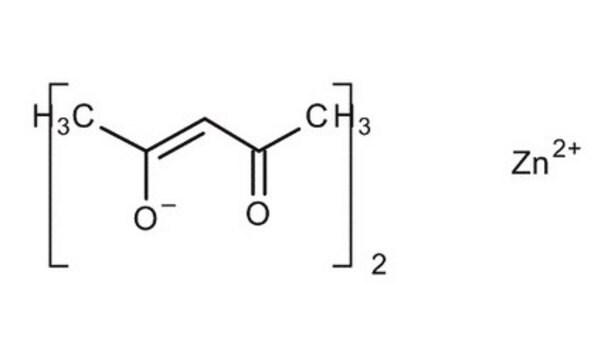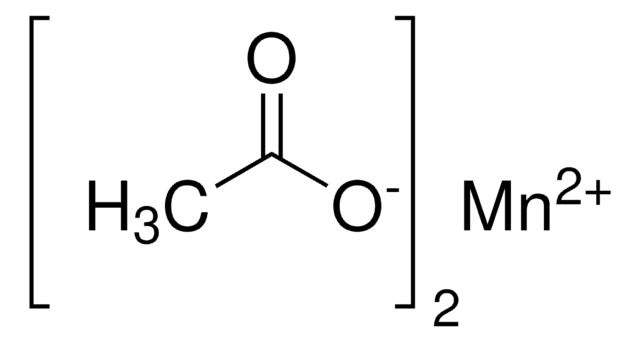383317
Zinc acetate
99.99% trace metals basis
Synonyme(s) :
Zn(OAc)2
About This Item
Produits recommandés
Niveau de qualité
Pureté
99.99% trace metals basis
Forme
solid
Pertinence de la réaction
core: zinc
reagent type: catalyst
Impuretés
<0.2% water
Densité
1.84 g/mL at 25 °C (lit.)
Chaîne SMILES
CC(O[Zn]OC(C)=O)=O
InChI
1S/2C2H4O2.Zn/c2*1-2(3)4;/h2*1H3,(H,3,4);/q;;+2/p-2
Clé InChI
DJWUNCQRNNEAKC-UHFFFAOYSA-L
Vous recherchez des produits similaires ? Visite Guide de comparaison des produits
Description générale
For small scale and high throughput uses, product is also available as ChemBeads (927805)
Application
- Synthesis of layered Zn-arylphosphonates with potential application in sorption, ion exchange or catalysis.
- Ultrasonic preparation of zinc sulfide nanoparticles coated on silica particles.
- Synthesis of ZnO/ZnS composites throughion exchange method (1)
- Fabrication of 3D hierarchical ZnO/ZnSheterojunction branched nanowires for enhanced photoelectrochemical watersplitting (2)
- Synthesis of Co3O4-decorated ZnO@ZnS core-shellstructures for efficient photocatalytic overall water splitting (3)
- Synthesis of ZnO photocatalysts (4)
Notes préparatoires
Mention d'avertissement
Danger
Mentions de danger
Conseils de prudence
Classification des risques
Acute Tox. 4 Oral - Aquatic Chronic 2 - Eye Dam. 1
Code de la classe de stockage
11 - Combustible Solids
Classe de danger pour l'eau (WGK)
WGK 3
Point d'éclair (°F)
Not applicable
Point d'éclair (°C)
Not applicable
Équipement de protection individuelle
dust mask type N95 (US), Eyeshields, Gloves
Faites votre choix parmi les versions les plus récentes :
Déjà en possession de ce produit ?
Retrouvez la documentation relative aux produits que vous avez récemment achetés dans la Bibliothèque de documents.
Les clients ont également consulté
Notre équipe de scientifiques dispose d'une expérience dans tous les secteurs de la recherche, notamment en sciences de la vie, science des matériaux, synthèse chimique, chromatographie, analyse et dans de nombreux autres domaines..
Contacter notre Service technique












